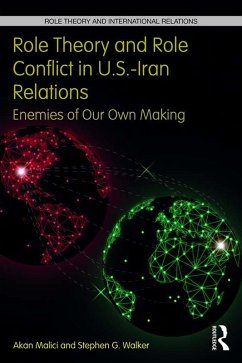Akan Malici and Stephen G. Walker argue that the dynamics of U.S.-Iran relations are based on role conflicts. Iran has long desired to enact roles of active independence and national sovereignty in world politics. However, it continued to be cast by others into client or rebel roles of national inferiority. In this book the authors examine these role conflicts during three crucial episodes in U.S.-Iran relations: the oil nationalization crisis and the ensuing clandestine coup aided by the CIA to overthrow the Iranian regime in 1950 to 1953; the Iranian revolution followed by the hostage crisis in 1979 to 1981; the reformist years pre- and post- 9/11 under Mohammad Khatami from 1997 to 2002. Their application of role theory is theoretically and methodologically progressive and innovative in illuminating aspects of U.S.-Iran relations. It allows for a better understanding of the past, navigating the present, and anticipating the future in order to avoid foreign policy mistakes.
Role Theory and Role Conflict in U.S.-Iran Relations is a useful resource for international relations and foreign policy scholars who want to learn more about progress in international relations theory and U.S. relations with Iran.
Dieser Download kann aus rechtlichen Gründen nur mit Rechnungsadresse in A, B, BG, CY, CZ, D, DK, EW, E, FIN, F, GR, HR, H, IRL, I, LT, L, LR, M, NL, PL, P, R, S, SLO, SK ausgeliefert werden.
'This important work marries role theory to a dynamic game-theoretic model, based on the "theory of moves," to elucidate strategic interactions during three major transitions in Iranian-U.S. relations. It sheds new light on the evolution of both conflict and cooperation in these relations, culminating in the 2015 agreement of Iran to desist from the development of nuclear weapons in return for the lifting of economic sanctions by the United States and other western powers.' - Steven Brams, New York University
'In this important book, Malici and Walker fulfill the promise of role theory and operational code analysis in understanding foreign policy. Through a series of carefully analyzed and richly detailed episodes in US-Iranian relations, the ways in which roles mediate the relationship between power and behavior are uncovered, revealing that power is by no means deterministic. In addition to its scholarly significance, the work of Malici and Walker is also policy-relevant and timely as the US and Iran attempt to reorient their relationship through efforts at mutual role transition.' Valerie M. Hudson, Texas A&M University
'In their analysis of key turning points in US-Iranian relations, Malici and Walker show misperception and misunderstanding on the part of the United States in trying to cast Iran in an inferior or client role. Their use of role theory is innovative and provides a fresh take on an important subject. This book is essential reading for anyone who wants to understand the source of Iranian enmity toward the United States.' - Deborah Welch Larson, Professor of Political Science, University of California, Los Angeles









